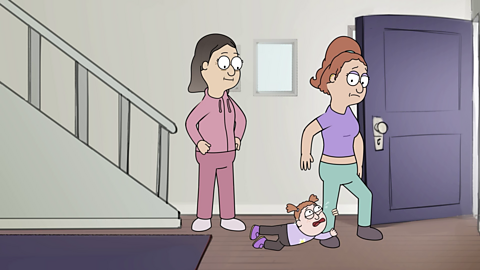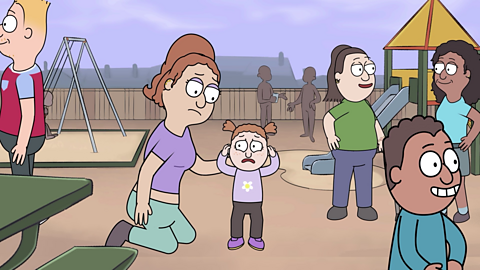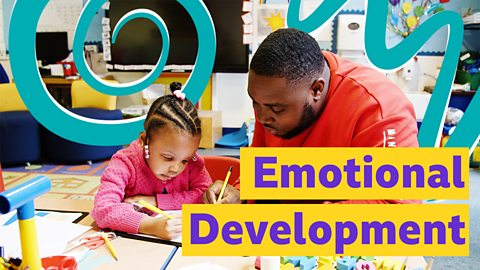One thing you donŌĆÖt expect when youŌĆÖre holding your newborn baby in your arms is that, in just a few short months, theyŌĆÖll be crawling, toddling, walking and eventually running.
And theyŌĆÖll often use this new superpower to run as quickly as they canŌĆ” away from you. When this happens, it can be incredibly scary and frustrating as a parent. Especially when youŌĆÖre out and about in public spaces.
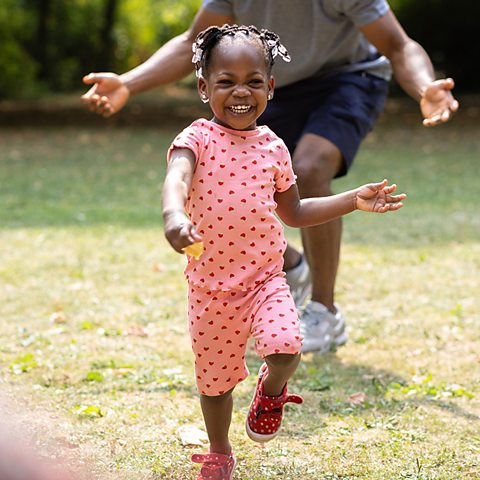
ŌĆ£I think it is very natural to be worried,ŌĆØ says child psychologist Dr Claire Halsey. ŌĆ£As parents, we see every danger, don't we? We're kind of hyper-alert to a child stepping off the curb or being out of sight. And that's a completely natural part of what we're designed to do.ŌĆØ
So what can we do to stop our little ones from running off? And how can we keep them safe while giving them room to explore and grow?
Claire shares her top tips below.
Why do toddlers run off?
The main thing to remember is that your toddler is not intentionally trying to upset or annoy you.
When your baby reaches walking age, they discover a whole new world.
Imagine that youŌĆÖve had to sit down or roll to get anywhere in your life. And then one day you discover suddenly that youŌĆÖve got a rapid mode of transport. YouŌĆÖre going to go for it, arenŌĆÖt you?
ŌĆ£Running off is part of a toddlerŌĆÖs natural and positive urge to explore, run, move and use their bodies,ŌĆØ explains Claire. ŌĆ£And all of this activity ŌĆō and telling you about it - helps their coordination, brain and speech development.ŌĆØ
For your toddler, running off is a completely normal impulse to find out more about the world that theyŌĆÖre in.
Their curiosity is a dominant drive.
ŌĆ£For young children, this world is absolutely incredible, and they just want to see every bit of it - touch it, play, and run about in it. They want to see the colours, explore the shapes and thatŌĆÖs developmentally really helpful for them.ŌĆØ
But, as we know, they are also completely oblivious to danger. ThatŌĆÖs why itŌĆÖs so important for us, as parents, to be aware of our children when weŌĆÖre out and about.

How to stop your child running off
1. Set up simple rules
ŌĆ£If youŌĆÖre going out and think your child might run off or get lost, then set up a few rules with them before you leave the house,ŌĆØ says Claire.
Rules may be very simple, using just 2-3 words. Keeping it short will ensure your toddler really understands what youŌĆÖre asking.
ŌĆ£You could say, ŌĆśStay close to meŌĆÖ. ŌĆśHold my handŌĆÖ is another clear rule.ŌĆØ
If you find you have your hands full, you could also share holding the shopping bag handles. This might be an easier instruction to follow than ŌĆ£stay closeŌĆØ, as there is something physical to hold on to.
Using clear and concise language and repeating one phrase when youŌĆÖre out and about will help your child remember what youŌĆÖve said and understand it.
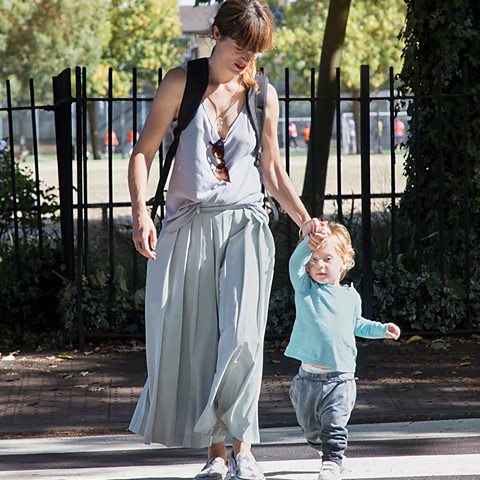
2. Make staying safe a fun game
Children are more attentive and responsive when activities are enjoyable and motivating.
ŌĆ£You can make a game out of staying safe when youŌĆÖre out and about,ŌĆØ explains Claire. ŌĆ£When you stop at the curb, for example, why not turn the Green Cross Code into something you do and say or even sing together at the curb side?ŌĆØ
Simon Says games are also a great way to practise listening skills and keep your child occupied in a space close to you.
You can fill the gap of their curiosity by talking and singing, and playing games.
Why not ask them to help you push the shopping trolley or pushchair? Or pretend you donŌĆÖt know where youŌĆÖre going and ask them to show you the way?
ŌĆ£You can play I Spy, look for colours they can see, or play a cloud spotting game,ŌĆØ suggests Claire. ŌĆ£Go out with them to collect some sticks and twigs, find the longest leaf, or coloured leaves. Your engagement with them as theyŌĆÖre moving around is helpful.ŌĆØ
3. Remember what they understand
For children who havenŌĆÖt quite mastered spoken words, or those who struggle with their language, try to find different ways to highlight whatŌĆÖs safe and what isnŌĆÖt.
ŌĆ£I think you can cue children from a very early age,ŌĆØ says Claire. ŌĆ£Alongside your language, you can use facial expressions and body language to show them that things can be dangerous. This will probably come very naturally to you.ŌĆØ
Try to put yourself in your childŌĆÖs shoes. At their age, how much can they comprehend and what can you do to help them?
When you say something is hot, for example, you can use your body language or a hand sign to represent the word. You can hold your hands up or turn your hand into a fan to show something is hot and shouldnŌĆÖt be touched.
You can also use a more animated voice to emphasise this message and make what you're saying more child-friendly.
ŌĆ£The other thing to bear in mind is they donŌĆÖt know what is worrying you,ŌĆØ explains Claire. When youŌĆÖre at the park, for example, they donŌĆÖt know that you canŌĆÖt see them. ŌĆ£Children think that you are all-powerful and know everything. They have no clue that theyŌĆÖve just run out of your view.ŌĆØ
And this concept, called the Theory of Mind, is very difficult to teach. So Claire recommends flipping the phrase around.
ŌĆ£The easiest thing to do is say, ŌĆśStay somewhere you can see meŌĆÖ, because if they can see you, you will most likely be able to see them.ŌĆØ


4. You donŌĆÖt have to do it alone
If youŌĆÖre going somewhere that you know is going to be crowded, or if your child is especially active, why not invite a friend or relative to come with you?
ŌĆ£That way, thereŌĆÖs two of you with eyes on your toddlers and you can enjoy the experience more,ŌĆØ explains Claire.
Bringing a friend with you means you can take turns keeping your little one engaged with games or activities. At the same time, you can also get a few moments to yourself to enjoy some fresh air, or simply rest.
5. Try not to let your anxiety take over
ŌĆ£Some parents can be put off taking their children out if they have strong concerns about them running off,ŌĆØ says Claire. But you shouldnŌĆÖt let this worry stop you.
ŌĆ£If this happens, your child will lose opportunities to learn the ŌĆśrulesŌĆÖ for being out and about. They also wonŌĆÖt get the chance to show you how they can stay close or come back when called.ŌĆØ
Claire suggests viewing going out as a chance for your child to practise staying nearby. ŌĆ£Make walks or trips out to the park shorter while you build confidence, and your child builds their understanding.ŌĆØ
What to do when your toddler runs off
Sometimes, no matter how much we prepare or chat with our children, they will run off anyway. If that happens, it can be an incredibly anxious time for you, but there are things you can do.
First things first, if youŌĆÖre in a big store, and you canŌĆÖt find them, get help straight away.
ŌĆ£It is really important to act quickly if youŌĆÖve lost sight of them and theyŌĆÖve not responded to your call.ŌĆØ
When you are calling for them, using their name is really important.

ŌĆ£You might have heard of the cocktail party effect,ŌĆØ says Claire. ŌĆ£If youŌĆÖre in a crowded and noisy room, you will hear your name being called even if you canŌĆÖt hear anything else.ŌĆØ
For your child, this is no different. ŌĆ£The most frequent word that your child has heard in their life is their name. So if youŌĆÖre going to give them an instruction, like ŌĆśstopŌĆÖ, ŌĆśstay thereŌĆÖ, or ŌĆścome backŌĆÖ, say their name first.ŌĆØ
DonŌĆÖt overcomplicate your instructions either. ŌĆ£Try not to say ŌĆśWhere have you got to?ŌĆÖ or ŌĆśYouŌĆÖre really upsetting mummyŌĆÖ, as your child wonŌĆÖt understand this. Say their name, tell them what to do and keep it short and sweet.ŌĆØ
When they do listen and come back to you, how you respond in that moment is also key.
ŌĆ£Children absolutely thrive on praise, donŌĆÖt they?ŌĆØ says Claire. ŌĆ£So make sure that youŌĆÖre giving them a lovely warm welcome when they come back, even if you feel extremely anxious inside.ŌĆØ

